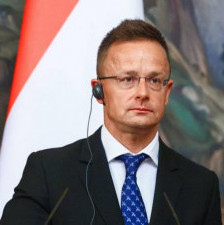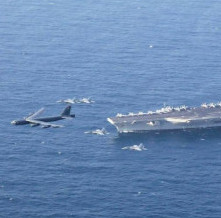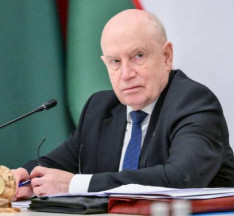The Russian and US representatives are getting ready to meet for consultations on Trump-Putin talks in Saudi Arabia, the effects of the Munich Conference on the US-EU relations, and investors are returning to Europe. These stories topped the headlines in Monday’s newspapers across Russia, according to TASS News Agency.
Vedomosti: US, Russia approaching summit in Saudi Arabia
Russian and US officials may meet in Saudi Arabia for the first time in the near future. There, they will hold talks and begin groundwork on organizing the summit between Russian President Vladimir Putin and his US counterpart Donald Trump, Reuters said on February 16, citing former chair of the House Foreign Affairs Committee Michael McCaul (R) and a source familiar with the travel plans of the delegation.
This is about launching full-scale talks on ending the Ukrainian conflict and on setting up the Putin-Trump summit, said Dmitry Suslov, Deputy Director of the Center for Comprehensive European and International Studies at the Higher School of Economics. The sides are restoring regular diplomatic interaction along an extensive agenda. "This is not about improving ties or abandoning confrontation. But the pause in relations, lingering since Biden, is coming to an end," the expert explained.
In Suslov’s opinion, Washington’s change of rhetoric is related to the US’ failed attempts to "strategically weaken" Russia. He also added that Trump is motivated to end the Ukraine conflict by his aspiration to fully engage in competition with China. That said, the expert noted that during dialogue, the US may try to pressure Russia with sanction threats, but Moscow has a more advantageous negotiating position in this regard.
In order to prepare the summit of the two leaders, several rounds of consultations might be needed, Suslov said. "There are many disputed issues where the sides differ. Above all, the US wants a truce [in Ukraine], ‘and leave the rest for later,’ while Russia disagrees. Additionally, the level of militarization of post-war Ukraine is unclear, as well as its status during these talks. The situation with security guarantees is also murky as well as with the possibility of Europeans participating in these negotiations. But if there is a desire of the heads of state to meet, then even one meeting of a consulting group may be sufficient," the expert said.
Vladimir Vasilyev, senior research fellow at the Russian Academy of Sciences’ Institute for US and Canadian Studies, also notes the importance of the consultations between the two countries. However, in his opinion, the US delegation is facing a difficult task of convincing not only Democrats but also some Republicans, even though this is Trump’s party, to support the final plan for Ukraine. As for Ukraine’s stance, the expert is confident that Trump is ready to apply maximum pressure on Vladimir Zelensky so that Kiev won’t hinder the talks.
Media: What Vance’s speech signals for US-EU relations
The course of events at the annual Munich Security Conference held on February 14-16 shocked EU representatives. With new realities setting in, Washington is no longer ready to display full unity with its European NATO partners and, essentially, is promoting the settlement of the Ukraine conflict without the EU.
The signs of alarm among the Europeans emerged after the most noticeable "Munich 2025 speech" by US Vice President JD Vance. He noted that the EU must resolve its own issues, including the matters of defense, while the Trump administration will find a way to pragmatically resolve the Ukraine conflict. That said, Vance stressed that the biggest threat to European security was "from within," rather than China and Russia. "The threat that I worry most about vis-a-vis Europe is not Russia, not China, it’s not any other external actor. What I worry about is the threat from within, the retreat of Europe from some of its most fundamental values," the US vice president said.
The Europeans took Vance’s speech personally and in a highly negative way because it raised sensitive issues of the trans-Atlantic community on a high level for the first time in years, Artyom Sokolov, a researcher at the European Studies Institute of the Moscow State Institute of International Relations, explained to Vedomosti. Europe perceives this as a challenge but the economies of the EU and US are closely intertwined. However, Vance’s speech showed that the US side is much better prepared to "reboot" the trans-Atlantic relations than the Europeans, Sokolov pointed out.
That said, the EU may propose concessions and "give Trump what he wants," for instance, by increasing the military budget. According to the expert, along the lines of the Ukraine crisis, Europe is indeed excluded from the negotiation process with only one function remaining - to pay for Kiev. All European initiatives or sending its "peacekeepers" to the conflict zone are mere talk, he emphasized. European countries may delay the negotiation process but essentially the EU is not acting as a separate player. "As for the urgent meeting of leaders called by Macron, there, most likely, a unified plan on supporting Kiev will be developed in order to prevent the frontline from crumbling, but nothing more than that," Sokolov said.
This is not a fight between allies in the Trans-Atlantic bloc because their relations already have a clear subordination between a senior partner, the US, and junior partners from the EU, Timofey Bordachev, research director at the Center for Comprehensive European and International Studies at the Higher School of Economics, told Vedomosti. According to him, Vance’s speech merely outlined the new order for the junior partners. Bordachev also believes that the US side wants to force the Europeans to spend more money on aid for Ukraine and escalate their relations with Russia even more.
That said, the latter does not benefit Europe, Bordachev insisted, because it wants to maintain trade with Russia while the US needs strained relations between the EU and Moscow to support its hegemony. As for the meeting of European leaders called by Macron, the expert thinks that this is the French president’s own PR stunt that won’t lead to anything serious.
Actually, Europe is far from any joint decision with regard to ending the conflict, Gabrielius Landsbergis, former Lithuanian foreign minister, told Izvestia.
"Realistically, it is impossible to believe that one conference will find the conflict’s solution. I think that this is just the beginning of more complex problems we will encounter in Europe," he said.
Kommersant: Investors returning to Europe
The February 12 phone call between Vladimir Putin and Donald Trump had a positive impact not only on the Russian but also on the European stock market. According to the results of the seven-day period ending on the day of the conversation, European stocks attracted $2.5 billion which is a record-high amount over more than two years. Global investors, together with the American ones, are increasing such investments, hoping to resolve the Russia-Ukraine conflict which would positively impact the economies of Europe’s largest countries.
Global investors were being cautious due to Donald Trump’s tariff war he launched in early February. Beginning on February 1, duties were imposed on goods from Mexico (25%), Canada (25%) and China (10%). That said, if the first two managed to negotiate a postponement, Beijing introduced reciprocal duties on coal, LNG, oil, agricultural equipment and motor vehicles imported from the US. "The tariffs introduced by Trump are rather a bargaining chip than a full-fledged escalation, however, a second round of tariffs cannot be ruled out," said Alyona Nikolayeva, a portfolio manager at Astero Falcon.
Managers do not anticipate further consistent demand for European assets and believe that what happened last week was rather a strategic reallocation than structural shifts in demand. According to Sergey Suverov, investment strategist at Aricapital Management Company, the path to peace won’t be easy and swift - the negotiations may take months, given the opposing views of the parties to the conflict in terms of the resolution principles.
Izvestia: Russian, US, UK warships join Komodo 2025 naval exercise
Russian warships as well as those from the US, France, the UK, and a number of other countries are participating in the Komodo 2025 naval drills hosted by Indonesia. Several tasks will be practiced during this exercise but the most important one is providing aid to those affected by a humanitarian catastrophe. Experts note that joint participation of Russia and NATO countries in the drills is a "major shift," triggered by recent events on the global stage and the US’ new policy course.
"It is important to highlight which countries participate and that they agreed to interact within the framework of the exercise," Admiral (Ret.) Sergey Avakyants, ex-commander of Russia’s Pacific Fleet, told Izvestia. "This is a major shift and a signal, intertwining with recent events on the world stage and the US’ new policy course," he explained.
The admiral added that Russia has vast experience of interacting with navies of very diverse countries.
He noted that it is important to Russia to strengthen other kinds of cooperation as well. "It is important to expand all kinds of interaction with the countries in that region which have a positive attitude to us," the admiral asserted.
Our presence in the Asia-Pacific Region will only grow, military expert Vasily Dandykin.
"Currently, Indonesia is one of the key countries in the region with a huge population and a rapidly growing economy," he pointed out. "Let’s not forget that our cooperation goes back to the middle of the past century. We helped Indonesia build their navy - this is a solid foundation of good relations," the expert added.
Vedomosti: What Trump and Modi discussed
On Friday, February 14, 2025, Indian Prime Minister Narendra Modi concluded his visit to Washington where he met with US President Donald Trump.
During the follow-up press conference, the two leaders outlined their plans and initial agreements. The key issues became the "evening out" of a trade imbalance by India lowering tariffs on US goods, increased supplies of US hydrocarbons, nuclear cooperation as well as the ramped-up arms trade.
In terms of oil, the replacement of Russian volumes (39%) with the American ones in India is unlikely, believes analyst Sergey Kaufman from Finam. According to him, the production growth in the US will slow down while demand in India will grow. "The US won’t have enough available volumes," Kaufman said.
According to Alexander Uvarov, the editor of the Atominfo portal, Delhi’s 2010 Civil Liability for Nuclear Damage Act hinders India and the US’ nuclear ties because it lets an operator of a nuclear power plant file legal suits against technology suppliers. "In global practice, the operator and the state are the ones who are paying," Uvarov noted.
TASS is not responsible for the material quoted in these press reviews



